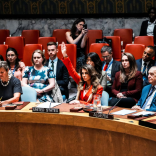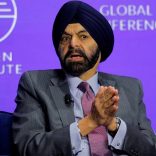US casts 6th veto at United Nations over war in Gaza
Former Israeli President and Nobel Peace Prize winner Shimon Peres dies at 93 – Watch

Al Jazeera / US President Obama leads tributes after former Israeli leader and Nobel laureate dies in his sleep following stroke.
Israeli ex-president and Nobel Peace Prize winner Shimon Peres died on Wednesday, some two weeks after suffering a major stroke.
The 93-year-old died in his sleep at around 3:00am (0000 GMT), Peres’ doctor Rafi Walden, who is also Peres’s son-in-law, told AFP news agency. Israeli media also confirmed the former Israeli president’s death.
He died surrounded by family members.
“Our father’s legacy has always been the future. Look to tomorrow, he taught us,” said Chimon Peres, Peres’ son, in a press conference.
“Today, we sense that the entire nation of Israel and the global community mourns this great loss,” he added. “We share this pain together.”
Israeli Prime Minister Benjamin Netanyahu expressed his “deep personal grief” in a statement in which he called Peres “the beloved of the nation”. Netanyahu is expected to deliver a personal message later on Wednesday, and the Israeli cabinet will convene for a special mourning session.
US President Barack Obama was quick to pay his respects, remebering Peres as “our dear friend” and “the essence of Israel itself”.
“There are few people who we share this world with who change the course of human history, not just through their role in human events, but because they expand our moral imagination and force us to expect more of ourselves. My friend Shimon was one of those people,” a White House statement said.
Canada’s Prime Minister Justin Trudeau said: “Shimon Peres was, above all, a man of peace. My deepest condolences to his loved ones and to the people of Israel on his passing.”
However, Al Jazeera’s Middle East analyst Yehia Ghanem said that many would remember Peres as a “war criminal”, especially in light of the 1996 Qana massacre. In that Israeli attack on a southern Lebanese village, at least 106 people were killed. Peres was then prime minister.
“People who are praising him [Peres] supported Israel and all of its crimes throughout its history,” Ghanem said. “The fact he ordered this massacre in Qana was and still is considered a war crime.”
Speaking of Peres’ legacy, Diana Buttu, a former Palestinian peace negotiator, told Al Jazeera: “This is a man who, from the very beginning, was a war criminal.”
Buttu added: “He’s somebody who believed in the ethnic cleansing of Palestine, somebody who when he had positions of power made sure that Paletsinian land that was occupied – not captured – was then turned over and made into Jewish Israeli settlements, which are war crimes under international law.”
Last remaining founding father
Peres had been in hospital near Tel Aviv since September 13, when he was admitted feeling unwell and suffered the stroke with internal bleeding.
Israel has been on edge over the health of its last remaining founding father, who had been under sedation and respiratory support in intensive care.
Peres held nearly every major office in the country, serving twice as prime minister and also as president, a mostly ceremonial role, from 2007 to 2014.
He won the 1994 Nobel Peace Prize jointly with Prime Minister Yitzhak Rabin and Palestinian leader Yasser Arafat for his role in negotiating the Oslo Accords, which envisioned an independent Palestinian state.
After suffering the stroke, he received an outpouring of support from across the world, including from Pope Francis, US President Barack Obama, the Clinton family, Donald Trump, Britain’s former Prime Minister Tony Blair and Russian President Vladimir Putin.
UN Secretary General Ban Ki-moon called him “tireless in seeking peace between Israelis and Palestinians”.
Heart trouble
There had been signs of improvement last week.
On September 18, Peres’ office said doctors planned to gradually reduce his sedation and respiratory support to judge his response.
His personal physician Walden had said at the time that Peres had seen “very slow, moderate improvement”.
But on Tuesday, a source close to Peres said his condition had taken a downturn and he was “fighting for his life”.
In January, Peres was hospitalised twice because of heart trouble.
In the first case, the hospital said he had suffered a “mild cardiac event” and underwent catheterisation to widen an artery.
He was rushed to hospital a second time just days later with chest pains and an irregular heartbeat.
Peres had sought to maintain an active schedule despite his age, particularly through events related to his Peres Center for Peace.
When leaving hospital on January 19, Peres said he was keen to get back to work.
“I’m so happy to return to work, that was the whole purpose of this operation,” he said.
Born in Poland in 1923, Peres emigrated to what was then British-mandated Palestine when he was 11. He joined the Zionist movement and met David Ben-Gurion, who would become his mentor and Israel’s first prime minister.
Peres became director general of the nascent defence ministry at just 29 years old. He was also seen as a driving force in the development of Israel’s undeclared nuclear programme.













Leave a Reply
Be the First to Comment!
You must be logged in to post a comment.
You must be logged in to post a comment.